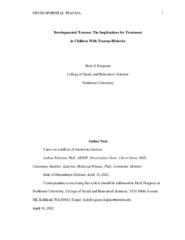Developmental Trauma: The Implications for Treatment in Children With Trauma Histories
Abstract
Child maltreatment encompasses five subcategories of physical abuse, sexual abuse, emotional abuse and/or neglect, and witnessing family violence. Maltreatment has been proven to impact a child's brain development in a negative way leading to developmental trauma. Areas of the brain that regulate emotional and behavioral responses are impacted as well as the stress response system. The purpose of this study was to learn from clinicians how they understand developmental trauma and its implications on treating children. Nine participants with master's degrees with 5 years of postgraduate professional experience were interviewed. This study was conducted with the phenomenological framework of Heidegger using the hermeneutic circle. Participants' lived experience of working with children with developmental trauma themes were Challenging, Rewarding, and Triggering. When clients do not move forward the theme for the participants were Reflecting. Participants also expressed Normalizing thoughts for graduate students and new clinicians considering working with this vulnerable population. The themes for understanding developmental trauma were Lack of Graduate Training in Trauma, the Pervasive Nature of Trauma, and the Dysregulation Effects of Trauma. Themes for how developmental trauma impacts treatment were Assessing, Observing, Diagnosing, Adapting, Attuning, and Modifying. Coinciding with previous research was the lack of education in graduate school around developmental trauma. Participants expressed how burnout can impact the level of care a clinician can give to their clients not unlike previous research. In addition, participants cautioned against misdiagnosis, as developmental trauma is not a diagnosis in the Diagnostic and Statistical Manual for Mental Disorders 5th Edition.
Original item type
PDF
Original extent
206 pages
Collections
Copyright
This original work is protected by copyright. Copyright is retained by the author(s). Works may be viewed, downloaded, or printed, but not reproduced or distributed without author(s) permission.


 Maintained by the Northwest University Library
Maintained by the Northwest University Library